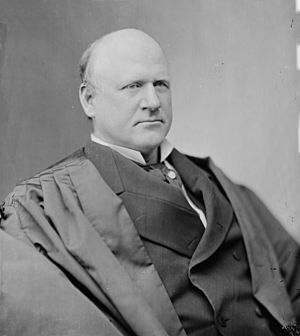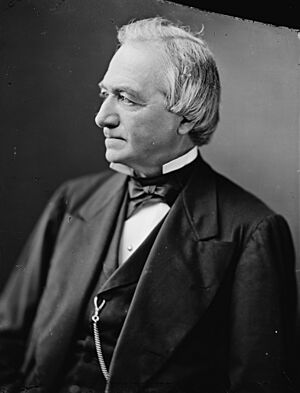Civil Rights Cases facts for kids
Quick facts for kids The Civil Rights Cases |
|
|---|---|

|
|
| Decided 15 October, 1883 | |
| Full case name | United States v. Stanley; United States v. Ryan; United States v. Nichols; United States v. Singleton; Robinson et ux. v. Memphis & Charleston R.R. Co. |
| Citations | 109 U.S. 3 (more)
3 S. Ct. 18; 27 L. Ed. 835
|
| Holding | |
| Neither the Thirteenth nor Fourteenth Amendments empower Congress to safeguard blacks against the actions of private individuals. To decide otherwise would afford blacks a special status under the law that whites did not enjoy. | |
| Court membership | |
| Case opinions | |
| Majority | Bradley, joined by Waite, Miller, Field, Woods, Matthews, Gray, Blatchford |
| Dissent | Harlan |
| Laws applied | |
| U.S. Const. amends. XIII, XIV; Civil Rights Act of 1875 | |
The Civil Rights Cases were a group of five similar legal cases. They were combined into one big case for the U.S. Supreme Court to review. In 1883, the Court decided that the U.S. Congress could not stop private people or businesses from treating people differently based on their race. This decision meant that the 14th Amendment only applied to actions by state and local governments, not to private actions.
The Court said that the Civil Rights Act of 1875 was against the Constitution. This Act had said that "all persons" should have "full and equal enjoyment" of places like hotels, public transportation, and theaters. It also said this applied to "citizens of every race and color," no matter if they had been enslaved before. The Supreme Court's ruling made this important law ineffective.
What Were the Cases About?
The Supreme Court's decision involved five different lawsuits. These cases came from lower courts. In each case, Black Americans had sued businesses. These businesses included theaters, hotels, and train companies. They had refused to serve Black Americans or kept them out of "white only" areas.
What Did the Court Decide?
The Supreme Court ruled 8-1 against the Civil Rights Act of 1875. Justice Joseph P. Bradley wrote the Court's main opinion. He explained that the 14th Amendment stops states from denying equal protection under the law. However, he said it did not give Congress the power to control what private individuals do.
Justice Bradley argued that the problems Black Americans faced were from private actions. They were not caused by state laws or government actions. He said the 14th Amendment only allows Congress to enforce rules against state actions. It does not allow Congress to make laws about things that are usually handled by states. He believed that private acts of racial discrimination were private wrongs. He felt the national government could not fix these wrongs.
The Court also looked at the 13th Amendment. This amendment ended slavery. The Court agreed that the 13th Amendment applies to private people. But they said it only stops people from owning slaves. It does not stop them from showing discriminatory behavior. The Court said it would be stretching the meaning of the 13th Amendment too far. It should not apply to every act of discrimination. For example, it should not apply to who a person chooses to serve in their business or invite to their home.
How Did People React?

Many African-American leaders were very upset and disappointed. They felt the Supreme Court had taken away important protections. T. Thomas Fortune, a newspaper editor, wrote that Black people felt "baptized in ice water." Many believed this decision ended an era. They thought the federal government would no longer protect the rights of African-American citizens.
The Supreme Court's decision greatly limited the federal government's power. It made it harder to ensure equal rights for Black Americans. State officials in the South used this decision to their advantage. They began to pass laws that made it legal to treat Black people as second-class citizens. This continued for about 70 more years. The Court's ruling led to the creation of Jim Crow laws. These laws made racial segregation (keeping races separate) a legal practice.
 | Sharif Bey |
 | Hale Woodruff |
 | Richmond Barthé |
 | Purvis Young |


